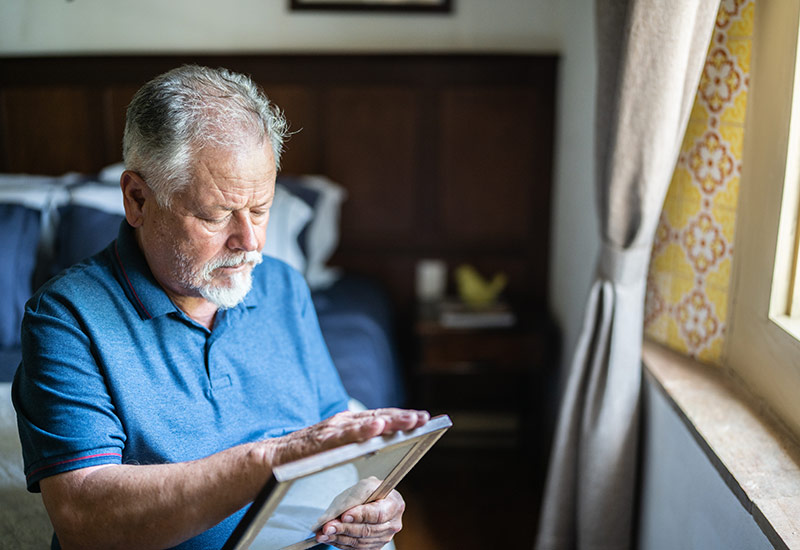Steps to Healing After the Death of Your Spouse or Partner

Losing your life partner is one of the most devastating experiences a person can face. The grief that follows feels overwhelming, all-consuming, and at times, unbearable. You may wonder if you’ll ever feel whole again or if the pain will ever subside. While there’s no set timeline for grief, your pain will decrease over time, especially with the right coping strategies. There’s no true guidebook for how to deal with losing a spouse, but these steps can help you navigate the process.
Practical Steps for Healing From the Loss of a Partner
Grieving the loss of a spouse will look different for everyone, but a few general tips can help you along the way. Try these practical steps as you navigate the loss of a partner:
Allow Yourself to Feel
The first step in healing is giving yourself permission to grieve. Don’t rush the process or try to “get over it” quickly. Grief is love with nowhere to go, and it’s important to honor those feelings. Cry when you need to cry. Scream if you need to scream. Talk to your partner’s photo if it brings you comfort. These actions aren’t signs of weakness—they’re part of processing your loss.
Find a Support System
Isolation does nothing to help grief go away faster. Reach out to family members or friends, whether they knew your spouse or not. Being around others who understand your pain can provide immense comfort. If you don’t already have a support system, consider trying one or more of the following:
- Local grief support groups
- Online grief communities
- Counseling or therapy
- Religious or spiritual communities
- Bereavement support from local organizations
Maintain Your Physical Health
Grief takes a toll on your body. After the loss of a spouse, it’s crucial to take care of your physical needs, even when you don’t feel like it. Here are some simple ways to maintain your health:
- Eat Regularly—Even if you don’t feel hungry, try to eat small, nutritious meals throughout the day. Eating an “unhealthy” snack is usually still better than eating nothing.
- Stay Hydrated—Drink plenty of water! Set daily goals for your fluid intake to keep yourself on track.
- Get Plenty of Sleep—Sleep and relaxation can be difficult after a loss. Do what you can to create a bedtime routine and a comfortable sleeping environment.
- Move Your Body—Gentle exercise like walking, stretching, or yoga can help release tension and improve mood.
Establish New Routines
Your daily routine likely revolved around your partner. Creating new routines can provide structure and stability during this chaotic time. Start small. Maybe it’s having coffee in a different spot each morning or taking a brief walk after dinner. These tiny changes can help you adjust to life without your partner while doing things you enjoy.
Honor Your Partner’s Memory
Coping with the loss of a partner doesn’t mean never thinking about them! There are many beautiful ways to honor your partner’s memory while still moving forward. You might try some of the following:
- Create a memory book or photo album
- Plant a garden in their honor
- Donate to their favorite charity
- Continue the traditions they loved
- Share stories about them with others
- Write them letters
- Celebrate their birthday or your anniversary
Working Through the Emotional Challenges
The loss of a partner comes with no shortage of emotional challenges. Everyone responds differently to feelings of grief, but here are a few strategies to cope with the most common emotions:
Loneliness
Loneliness is one of the most difficult aspects of losing a partner. Thankfully, you have several options for combatting feelings of isolation. You might:
- Schedule regular check-ins with friends or family
- Consider adopting a pet if you’re ready for the responsibility
- Join clubs or classes that interest you
- Volunteer for causes you care about
- Listen to music, podcasts, or audiobooks to fill the silence
Guilt and Regret
Many people experience guilt after losing their partner. You might feel guilty for the things you said or didn’t say, the times you argued, or even the moments when you feel happy. These feelings are normal, but they don’t serve your healing. Try to remember that you are human, and the imperfect moments are a package deal with the good ones. Do what you can to focus on the love you shared rather than dwelling on regrets.
Handling Triggers and Difficult Days
Certain dates, places, songs, or smells might trigger intense grief. Anniversaries, birthdays, and holidays can be particularly challenging. You can prepare for these difficult times by:
- Planning ahead for significant dates
- Creating new traditions that honor your partner’s memory
- Giving yourself permission to skip events if you’re not ready
- Having a support person you can call when triggers hit
At Your Side During the Bereavement Process
Every healing journey is unique, and while these tips can help, you’ll undoubtedly run into bad days along the way. At Agape Hospice & Palliative Care, we’re committed to helping our patients’ families cope with grief in healthy ways. Our bereavement services are designed to support you long after the passing of your loved one. Contact our team based in Los Angeles and Orange Counties to learn more.

